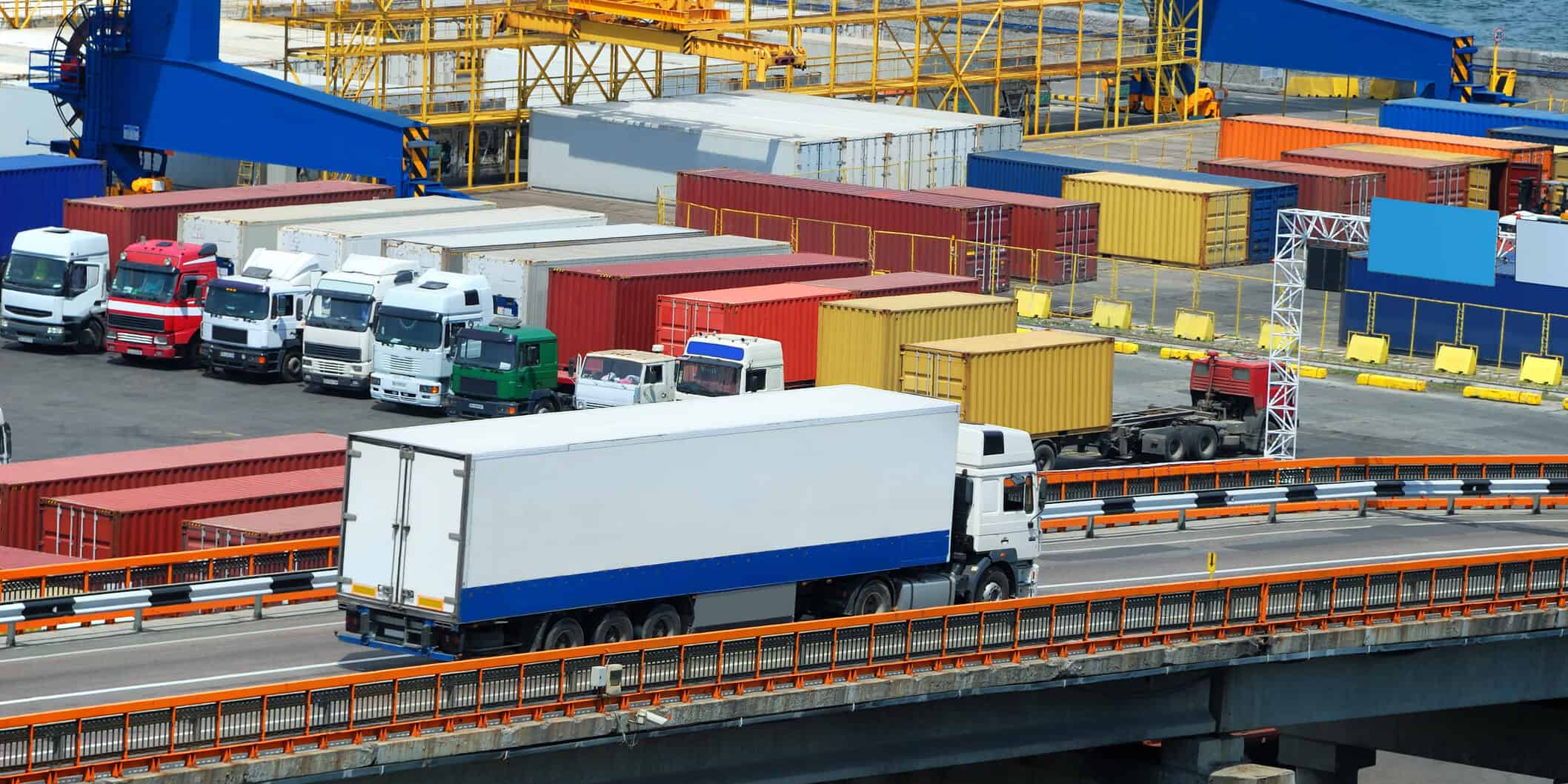“A ship in harbor is safe, but that is not what ships are built for.” William G.T. Shedd

A person standing under an umbrella, symbolizing comprehensive freight insurance coverage
Shipping by air, ground, or ocean is an inherently risky business. But you already know that. In today’s erratic and turbulent times, as a shipper, you need to safeguard your business with a protective shield from predictable and unpredictable events beyond your control.
Supply chain disruptions are now the rule rather than the exception. They can negatively affect your operations. They can impair support to your customer. And they can batter or kill your brand.
So, you must take special care to avoid or mitigate disruptions and their costs in transporting your cargo/freight.
One way to do that is to insure your freight. But many shippers don’t get this added protection, or they don’t get the right type and amount of freight/cargo insurance. When disruptions or disasters strike, the aftermath can be devastating.
Without further ado, let’s dive into the central aspects of cargo/freight insurance.
Why shippers need cargo and freight insurance
Logistics and supply chain management are challenging endeavors. They are rife with risk. That makes risk management a key part of business planning. In answering why you need cargo and freight insurance, let’s unpack the risks shippers face.
Risks come in multiple varieties. That said, there are two main categories of risk—predictable and unpredictable.
- Predictable Risks: Predictable risks are those we know may occur. However, we might not know when they will occur. So, there’s an element of uncertainty. Some examples are fires, theft, piracy, and the capsizing of ships. Regardless of the type of risk, they result in various levels of damage, destruction, and costs.
- Unpredictable Risks: Unpredictable risks, meanwhile, occur with no warning. Covid-19 is a prime example. It was a once-in-a-century situation no one expected. Another example is natural disasters. They include hurricanes, tornadoes, and tsunamis, to name a few examples. These risks are especially damaging because you can’t control them.
Whether risks are predictable or unpredictable, they are disruptive operationally and financially.
One recent example of a disruptive risk is the loss of about 4,000 Porsches, Bentleys, and VWs.
On February 16, 2022, the Felicity Ace, caught fire near the Azores. It turns out this
was a lithium-ion battery fire. That made extinguishing the fire by water alone difficult. The
Portuguese Navy rescued the 22-member crew. But the fires decimated the cargo.
The
estimated loss comes to $488 million.
That’s the challenge to your business and your supply chain. And even though these risks are unpredictable and occur less often, they are costlier.
Also, not discussed yet is freight liability insurance, which is the basic liability coverage every carrier offers. This should only be considered as your baseline level of insurance. But It won’t be sufficient under any circumstances.
Carriers’ liability insurance is rarely enough to cover the value of your goods in case of loss or damage. Furthermore, this coverage is restricted to occurrences resulting from the carriers’ negligence or wrongdoing.
With that background in mind, let’s delve into the nuances of cargo and freight insurance.
The difference between cargo and freight insurance

An overturned 18-wheeler truck carrying cargo. Who is responsible if your goods are damaged?
You might not know the difference, so we’ll start by explaining the nuances of cargo and freight insurance. Stated plainly—they are not the same.
What is Cargo Insurance?
Cargo insurance is your next level of insurance coverage, protecting you from financial loss
because of lost or damaged cargo. For example, it pays you for the coverage amount if a covered
event happens and impacts your cargo.
Covered
events comprise natural disasters, extreme weather, and vehicle accidents. So, cargo
insurance on its own extends besides “Acts of God” events. That means it offers more than
adequate, but not total coverage.
What is Freight Insurance?
Freight insurance is a different matter. It provides coverage for things carrier and cargo insurance do not cover. For example, freight insurance provides coverage for non-physical loss or damage, like delays and labor disputes. It’s more comprehensive and has some other benefits, which we’ll get into below.
That said, freight insurance is a policy you take out to insure all or a part of your cargo. You should also consider freight insurance when shipping fragile products and high-dollar value items. Freight insurance provides additional coverage above the limited coverage a carrier provides as well as the one cargo insurance provides.
To clarify the differences between these two even more, let’s look at the benefits of cargo and freight insurance.
The benefits of cargo/freight insurance
The Benefits of Cargo Insurance: Consider this your next level of insurance—a place from which to assess extra coverage.
Here’s why cargo insurance is important.
- It provides a structured, predictable process for filing and recovery of claims.
- With a small investment, you can minimize your financial loss.
- It protects profits from unexpected damage or loss, including Force Majeure.
- It gives you a certain amount of peace and security.
You can see why cargo insurance is needed. Cargo insurance provides a fixed starting point. The benefits are basic and might be sufficient. Whether it’s sufficient depends on your particular shipping needs. Next, we’ll look at the benefits of freight insurance.
The Benefits of Freight Insurance: Consider this a premium level of
insurance that covers all or part of your freight to give you the maximum coverage you deem
necessary.
- You can tailor your freight insurance coverage in the terms and conditions of the policy. Then, you can buy insurance to fill gaps in your existing insurance coverage.
- Freight insurance coverage extends beyond loss and damage. It also includes delayed shipments, which are on the rise because of backlogs caused by Covid-19.
- Claims processing for freight damage or loss is speedier. Cargo claims processing takes about 30 days vs. 270 days for freight claims.
- Like cargo insurance, freight insurance gives you peace of mind.
You can see why you need freight insurance. It represents a powerful tool in your risk management toolbox. You should explore its benefits after exhausting your current insurance coverage.
Along with considering the benefits, you must also consider the costs.
Weighing the costs of cargo/freight insurance
In considering your options, you might ask two questions:
- First, you might ask how much is cargo insurance?
- Next, you might ask how much is freight insurance?
Those are reasonable and relevant questions. To answer them, you should take a holistic view of your needs. Costing out your options can be time-consuming. To simplify the process, you should follow a systematic process to assess your risks.
The best place to start is to consider your needs. Examine the cargo you plan to ship, where you want to ship it, and how you want to ship it. Then examine the causes of risks. Next, determine whether you’re shipping high dollar value or sensitive items. Those factors will inform the types and level of insurance you will need.
Let’s start with your carrier’s liability insurance.
When considering liability insurance, it is important to know what your freight carrier offers. That information will pinpoint what’s not covered. It identifies the gaps and provides a place from which you can structure the insurance you will need. As mentioned above, liability insurance is rarely enough to cover the value of your cargo in case of loss or damage, so you must address the gaps it leaves.
As you analyze what’s covered, what still needs coverage, etc., you will tailor how much insurance to buy. You’ll also determine what’s right for your needs: cargo insurance, freight insurance, or some mix of the two. Costing out these options should provide you with several options.
From there, you can select the optimum solution that balances cost and coverage. So, you will end up with a mix that meets both needs, resulting in a tailored solution. Failure to cost out your options can be ruinous, as the loss of cargo on the Felicity Ace demonstrates.
As mentioned above, this can be an intricate process. That’s where an experienced and reliable freight forwarder can help you. Working with a specialized international freight forwarding company would be even more beneficial. They can offer authoritative advice to ensure you only buy the insurance you need.
Understanding and leveraging the nuances of cargo and freight insurance
With logistics and supply chain management, anything can happen. That’s why planning plays such a significant role in what freight forwarders do. Recognizing the uncertain and stormy times of the New Normal, planning is essential in protecting your cargo. And so are cargo and freight insurance coverage.
After weighing the costs and benefits, it should be clear buying cargo/ freight insurance is inexpensive compared to your potential loss. Just look at the case of the Felicity Ace. It’s a necessary part of any risk mitigation plan when it’s used to plug any gaps and limit your exposure to risk.
But it’s more than being cautious or sensible. It’s doing due diligence. It’s the difference between prudence and recklessness. That makes purchasing additional insurance for your shipment a prudent choice. Beyond meeting your needs, cargo/freight insurance can give you a competitive advantage.
You can gain a competitive edge by buying cargo/freight insurance to fill gaps not covered by your contracts and risk management plans. When you buy cargo/freight insurance wisely, you’ll be better prepared to withstand a supply chain crisis, which makes it an invaluable investment rather than a cost.
We’ve got you covered at Latin American Cargo. Our trained experts will help you minimize your risk and handle your shipping better, faster, easier, smarter. They will keep your cargo moving. LAC strives to protect your business, deliver uninterrupted customer service, and build your brand. We do that with a customer-oriented mindset.


 LAC Team
LAC Team


